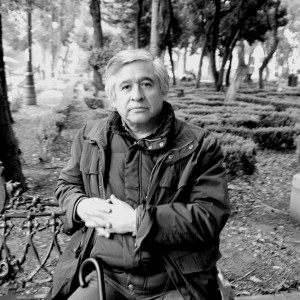
RETROSPECTIVE: JUAN ANTONIO DE LA RIVA
In the 1980s through to the early 2000s when Mexico’s film industry was at its lowest point, very few filmmakers produced films that were selected at important film festivals around the world. One of the leading directors of that time was Juan Antonio de la Riva (b. 1953, San Miguel de Cruces, Durango). VLAFF is thrilled to present a retrospective of three of his most important films that helped Mexican cinema not to disappear from the international scene: Wandering Lives (Vidas errantes, 1985), Wooden Town (Pueblo de madera, 1990) and Mountain Hawk (El gavilán de la sierra, 2002).
Juan Antonio de la Riva is well-known as both a writer and director, and in the course of his outstanding career has made 18 feature-length and two short films. In his early film, Wandering Lives, he reveals his abilities as a creator in the making, embracing an auteur cinema style to express something specific and personal: the screening of films in both itinerant and newly erected theatres in his hometown in the Sierra Madre mountains of Durango, which shaped his childhood so profoundly.
In Wooden Town, Juan Antonio de la Riva’s mastery of his cinematographic world is evident—from the characters’ costumes, to the language, and through to the solid plot structure. The visual narrative form, using a sequence shot, tries to show reality as it is, without pre-fabricating the lives of the characters. The best way to accomplish that was to allow the actors to roam freely around the set while the camera contemplated their actions with subtle movements.
In his later film, Mountain Hawk, Juan Antonio de la Riva shows himself to be an experienced director making use of extraordinary narrative resources. First, by killing off one of the main characters in the first sequence, and then by telling the story of this man’s life with scenes from the past, using single sequence flashbacks, masterfully combining the before and now in one take, in one frame. With this film, Juan Antonio de la Riva’s talent as a writer also stands out, as the work of structuring such a complex plot ultimately began with the script. He reveals himself as a true film master through the skillful way in which the story seamlessly unfolds on screen.
In addition to an extensive film career as a director, Juan Antonio de la Riva has also served as president of the Mexican Film Academy of Motion Pictures and is an expert in the history of Mexican cinema. We are very happy to welcome him to Vancouver to present these three films at VLAFF and to share his extensive knowledge of Mexican cinema with us.
(From the book El ensayo fílmico de Juan Antonio de la Riva by Iván Delhumeau).
